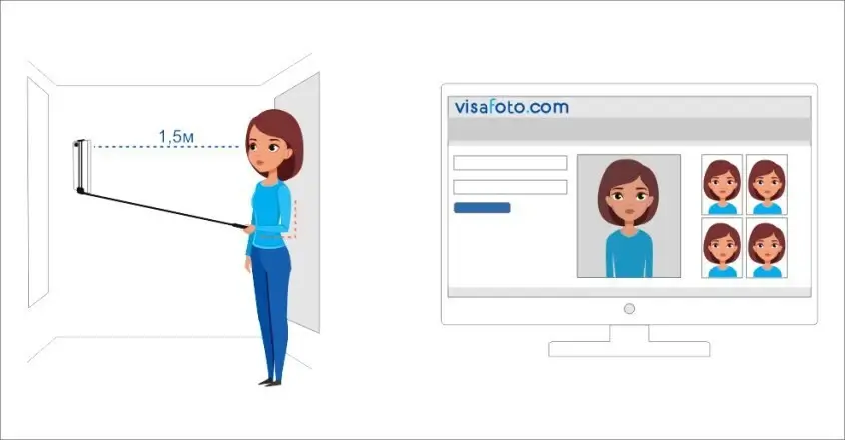Complete Thailand Visa Guide for 2026
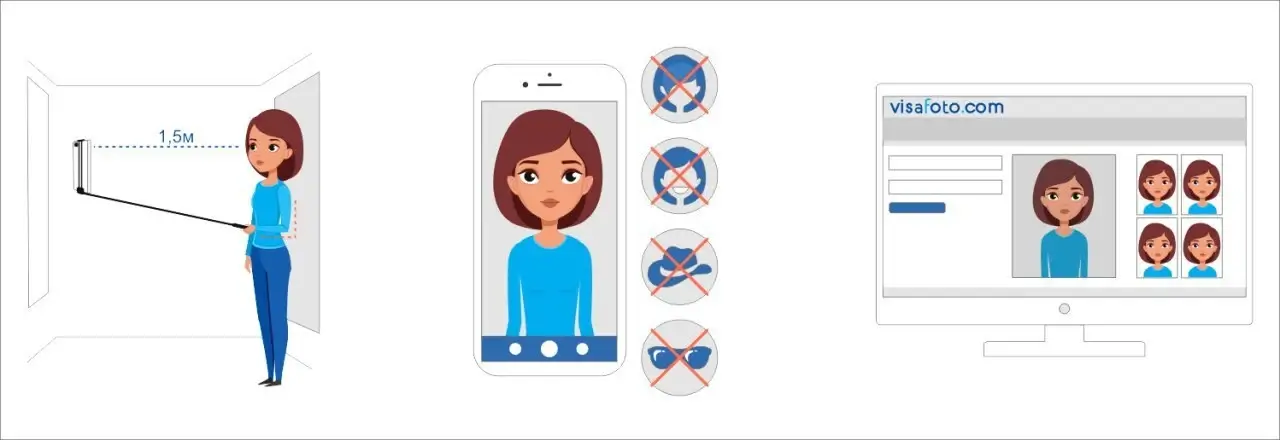
With Thailand’s allure as a top travel destination showing no signs of fading, being up-to-date on the visa process is essential for anyone planning a visit in 2026.
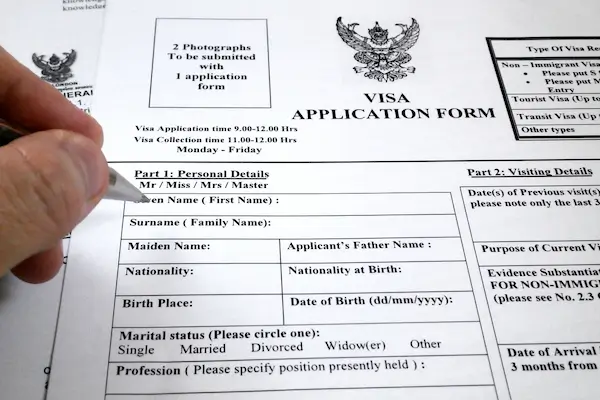
Our guide simplifies the entire procedure, covering everything from the new Thai visa policy to visa types and application steps, and is aimed at helping tourists, professionals, and long-term visitors navigate their travel plans with ease.
Table of contents
- Thailand Visa Policy Updates in 2026
- Thailand Tourist Visa Types and Requirements
- Thailand Non-Immigrant Visa Categories
- Thailand Special Tourist Visa (STV)
- Thailand Work Visa: Requirements for obtaining a work permit.
- Thailand Digital Nomad Visa
- Long-Term Resident Visa (LTR)
- How to apply for a Thailand visa online?
- How to apply for a Thailand visa in person?
- Documents required for Thailand tourist visa application
- Thailand Visa photo requirements
- Get your Thailand Visa photo online!
- Thailand Visa Photo App
- Thailand Visa processing time
- Thailand Visa fees
- Thailand Visa extension rules
Thailand Visa Policy Updates for 2026
As of 2026, international travelers under Thailand's Visa Waiver Program must complete the Thailand Digital Arrival Card (TDAC) online before arrival, replacing the former TM6 form. While border submission is possible, advance registration via the official platform is strongly recommended to ensure smooth entry.
Thailand Tourist Visa Types and Requirements
Thailand provides a range of visa options for tourists, each with its own set of criteria and eligibility requirements:
Countries Eligible for Thailand Visa-Free Entry (2026)
Thai visa exemption rules allow citizens from 93 countries to enter visa-free for tourism or short business stays up to 60 days, extendable by 30 days at immigration. Use the table below for the full, verified list (requires TDAC).
- Albania
- Andorra
- Argentina
- Australia
- Austria
- Bahrain
- Belgium
- Bhutan
- Brazil
- Brunei
- Bulgaria
- Cambodia
- Canada
- Chile
- China
- Colombia
- Croatia
- Cuba
- Cyprus
- Czech Republic
- Denmark
- Dominica
- Dominican Republic
- Ecuador
- Estonia
- Fiji
- Finland
- France
- Georgia
- Germany
- Greece
- Guatemala
- Hong Kong
- Hungary
- Iceland
- India
- Indonesia
- Ireland
- Israel
- Italy
- Jamaica
- Japan
- Jordan
- Kazakhstan
- Kosovo
- Kuwait
- Laos
- Latvia
- Liechtenstein
- Lithuania
- Luxembourg
- Macau
- Malaysia
- Malta
- Maldives
- Mauritius
- Mexico
- Monaco
- Mongolia
- Myanmar (14 days)
- Nepal
- Morocco
- Netherlands
- New Zealand
- Norway
- Oman
- Panama
- Papua New Guinea
- Peru
- Philippines
- Poland
- Portugal
- Qatar
- Romania
- Russia
- San Marino
- Saudi Arabia
- Singapore
- Slovakia
- Slovenia
- South Africa
- South Korea
- Spain
- Sri Lanka
- Sweden
- Switzerland
- Taiwan
- Tonga
- Trinidad and Tobago
- Turkey
- Ukraine
- United Arab Emirates
- United Kingdom
- United States
- Uruguay
- Uzbekistan
- Vietnam
Thailand Visa on Arrival (VoA) – 2026 Rules
Citizens whose nationalities are not on Thailand's 93-country visa exemption list need a Visa on Arrival (VoA) for short tourism stays.
The Visa on Arrival allows eligible visitors a 15-day tourism stay at designated airports/land borders, requiring a passport valid 6+ months, confirmed onward ticket within 15 days, recent 4x6 cm photo, proof of funds (10,000 THB/person or 20,000 THB/family), accommodation details, and 2,000 THB cash fee.
Citizens of 31 countries qualify (expanded from 19 on July 15, 2024, as visa exemptions covered more nations). All must complete TDAC online prior to arrival.
- Armenia
- Bolivia
- Bosnia and Herzegovina
- Cape Verde
- Colombia
- Comoros
- Cook Islands
- Côte d'Ivoire
- Ethiopia
- Georgia
- Haiti
- India
- Liberia
- Marshall Islands
- Micronesia
- Moldova
- Morocco
- Namibia
- Nauru
- Niue
- Palau
- Papua New Guinea
- Samoa
- Seychelles
- Solomon Islands
- St. Lucia
- Timor-Leste
- Tonga
- Tuvalu
- Venezuela
Many prior lists overlapped with the expanded 93-country visa exemption scheme (effective July 15, 2024), reducing practical VoA usage. No 2026 changes reported; requirements and 15-day limit unchanged.
For more details, please read our article on Thailand Visa on Arrival Questions.
Single-Entry Tourist Visa (SETV) vs. Multiple-Entry Tourist Visa (METV)
The choice between a Single-Entry Tourist Visa (SETV) and a Multiple-Entry Tourist Visa (METV) depends on one's travel needs. For those planning only one visit to Thailand, the SETV is adequate. However, if you anticipate traveling in and out of Thailand several times within a six-month period, the METV offers more convenience and flexibility.
The main differences are:
| Feature | Single-Entry Tourist Visa (SETV) | Multiple-Entry Tourist Visa (METV) |
|---|---|---|
| Number of entries allowed | One | Multiple |
| Duration of stay | Up to 60 days | Up to 60 days per entry |
| Validity period | Typically 3 months | Typically 6 months |
| Extension option | Yes, for an additional 30 days | No extensions allowed |
Thailand Non-Immigrant Visa Categories
Thailand offers a variety of Non-Immigrant Visas for foreigners who wish to stay for reasons beyond short-term tourism. Below are the primary categories:
- Business Visa (Non-Immigrant B): This visa is intended for those engaging in business or professional activities in Thailand. Business Visa types include:
- Non-B Visa: Suitable for activities like attending business meetings or negotiating contracts.
- Work Visa: For individuals employed by Thai companies or teaching in Thailand.
- Education Visa (Non-Immigrant ED): Designed for those accepted into Thai educational programs, this visa is for students at schools or universities, as well as participants in training courses or seminars.
- Retirement Visa (Non-Immigrant O-A and O-X)
- O-A Visa: For foreigners aged 50+ planning to retire in Thailand. Valid for one year, with renewal options. Applicants must prove financial stability with a monthly income of at least 65,000 baht (approx. USD 1915) or savings of 800,000 baht (approx. USD 23,564).
- O-X Visa: A renewable five-year visa for retirees from designated countries, with similar financial prerequisites as the O-A visa.
- Marriage Visa (Non-Immigrant O): This visa serves foreigners married to Thai citizens, allowing them to live in Thailand. Requirements include a marriage certificate, financial proof (minimum monthly income of 40,000 baht or USD 1178), and other necessary documents as determined by immigration authorities.
Thailand Special Tourist Visa (STV)
Introduced after the 2020s border reopening, the Special Tourist Visa permits long-term stays in Thailand. Under the STV program, visitors can initially stay for 90 days, with the option to extend twice, each extension adding another 90 days. This means tourists can potentially reside in Thailand for up to 180 consecutive days. Note that the STV cannot be converted to another visa category while in Thailand.
To be eligible for the STV, applicants must fulfill these criteria:
- Be from low-risk countries as defined by Thailand's Public Health Ministry.
- Adhere to health protocols, including a 14-day quarantine upon arrival (Alternative State Quarantine).
- Show evidence of where they will stay during their time in Thailand.
- Provide proof of payment for designated accommodations or hospital arrangements during quarantine.
Though the STV was initially a pandemic-related measure, travelers should consult Thai authorities or their local embassies to check its current status and any changes or new visa options that may have emerged since its launch.
Thailand Work Visa: Requirements for obtaining a work permit.
If you're planning to work in Thailand, you'll need both a suitable visa and a work permit. The work permit application process must be completed within 90 days of entering Thailand with a Non-Immigrant Visa.
While all work-related visas fall under the Non-Immigrant category, they include specific subtypes to accommodate different activities:
- Non-Immigrant Visa IB (Investment and Business): Designed for those engaged in investment or business activities. It allows entry for up to 90 days for projects approved by Thailand's Board of Investment.
- Non-Immigrant Visa B-A (Business Approved): For those investing in specific Thai businesses, granting a one-year stay.
- Non-Immigrant Visa M (Media): Tailored for journalists seeking to work in Thailand for over three months.
It's important to note that individuals with a Visa on Arrival or Tourist Visa are not permitted to work or apply for a work permit in Thailand.
Thailand Digital Nomad Visa
Thailand has launched the Destination Thailand Visa (DTV), also known as the Digital Nomad Visa, to attract remote workers, freelancers, and digital nomads. To qualify for the DTV, applicants must be at least 20 years old, have a bank balance of at least 500 000 baht (roughly USD 14 730), and work for an overseas company. The DTV allows family members, including spouses and children under 20, to accompany the visa holder.
The DTV is valid for five years, allowing stays of up to 180 days per entry. After five years, holders can apply for a one-time extension of another 180 days. As long as you stay in Thailand for fewer than 183 days per year, you won't need to pay taxes as a digital nomad in Thailand.
For more detailed information, check out our comprehensive guide on the Thailand Digital Nomad Visa.
Long-Term Resident Visa (LTR)
The Long-Term Resident Visa (LTR) is designed to attract talented foreigners, including wealthy individuals, retirees, and highly skilled professionals, offering a path for extended stays and numerous benefits in Thailand.
There are four main Thai Long Term Visa options:
- Wealthy Global Citizens: Requires a minimum of USD 1 million in assets, an annual income of at least USD 80,000 over the past two years, and investment in Thailand amounting to at least USD 500,000.
- Wealthy Pensioners: Open to those aged 50 and above, with a passive income of at least USD 80,000 annually. For incomes between USD 40,000 and USD 80,000, a minimum investment of USD 250,000 in Thailand is required.
- Work-From-Thailand Professionals: Tailored for remote workers with foreign employers, allowing up to four dependents under 20. Applicants need minimum health coverage of USD 50,000 or a deposit of at least USD 25,000 in a Thai bank.
- Highly Skilled Professionals: For experts in specific industries employed by Thai businesses or educational institutions, with a minimum of five years of relevant work experience.
The LTR Visa is available for up to 10 years, initially for five years, with the option for a five-year renewal if the eligibility conditions continue to be met.
How to apply for a Thailand visa online?
To apply for a Thailand visa online, you need to follow these straightforward steps:
- Visit the official Thailand E-Visa website.
- Fill out the online application form.
- Upload the necessary documents.
- Pay the required visa application fee. Thai e-visa payments can be made using credit cards (VISA and MasterCard).
- Wait for visa approval. You can check your Thai visa status online on the portal until your visa is processed.
- Once your application is approved, you'll receive a QR code, enabling you to use the automated immigration gates when you arrive in Thailand.
Read more: QR code storage on your phone
How to apply for a Thailand visa in person?
If an in-person application is necessary for your situation, here’s how you can apply for a Thailand visa in person:
- Collect the required documents as listed in this article.
- Book an appointment at the nearest Royal Thai Embassy or Consulate.
- Submit your completed application form and documents to the consular officer.
- Pay the relevant visa fee.
- After your application is processed, you will be notified to collect your passport with the visa.
Documents required for Thailand tourist visa application
The documents typically needed include:
- A passport valid for at least six months.
- A completed visa application form, which can be obtained from the embassy or consulate.
- Recent passport-sized photos.
- Proof of accommodation in Thailand, such as hotel reservations or invitation letters.
- Financial documentation, like bank statements or proof of income, typically around 10,000 baht for individuals or 20,000 baht for family travelers.
- A travel itinerary or flight bookings.
Thailand Visa photo requirements
When applying for a Thailand visa, whether online or at a consulate, specific Thai Tourist Visa photo requirements must be met.
For in-person application:
- The Thai visa photo size for most applications must be 35×45 mm (approximately 1.4×1.8 inches). While the Thai Visa-on-Arrival photo size must be 40×60 mm.
- It should display a natural skin tone with appropriate brightness and contrast.
- The image must capture a close-up of your head and partial shoulders.
- Your head should be straight, and centered, with a neutral expression, clear focus, and no ink marks, creases, or lines.
- The face should cover 70-80% of the photo (from forehead to chin).
- Eyes must be open, with no hair covering the face.
- Prescription glasses are allowed but must be clear, thin-framed, with no flash reflection or obstruction of the eyes.
- Headgear, hair accessories, or facial ornaments should not obscure the face.
- The background must be plain white, free of other people or objects.
- Lighting should be even, with no shadows on the face or background.
- Red-eye in photos is not permitted.
For online applications:
- The photo file size must be under 150 KB.
- High-resolution images are required to ensure clarity without pixelation.
- The background must be plain white or light-colored, without shadows or objects.
Here is an example:
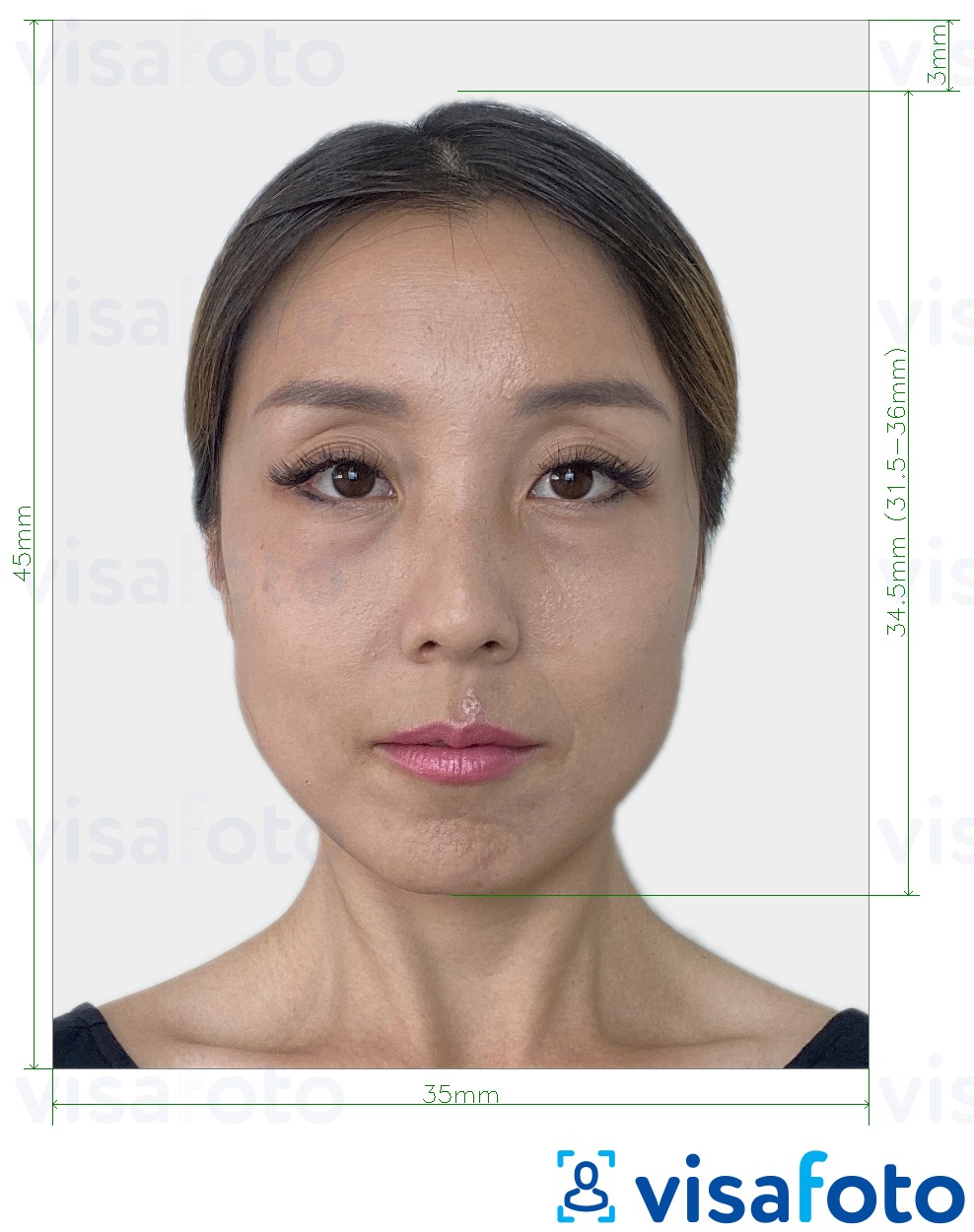
Get your Thailand Visa photo online!
Save both time and money on your Thailand visa application by getting your photo done professionally online. With Visafoto, you can secure a picture to meet official standards without the hassle of visiting a photo studio.
Simply snap a picture of yourself following our guidelines and upload it to our tool. Don’t stress about the format, background, or specific dimensions — we'll take care of all that. Visafoto has been specializing in document photos since 2013, ensuring compliance with requirements for every passport, visa, driver’s license, and more worldwide.
First take a photo of yours which will look like this one:
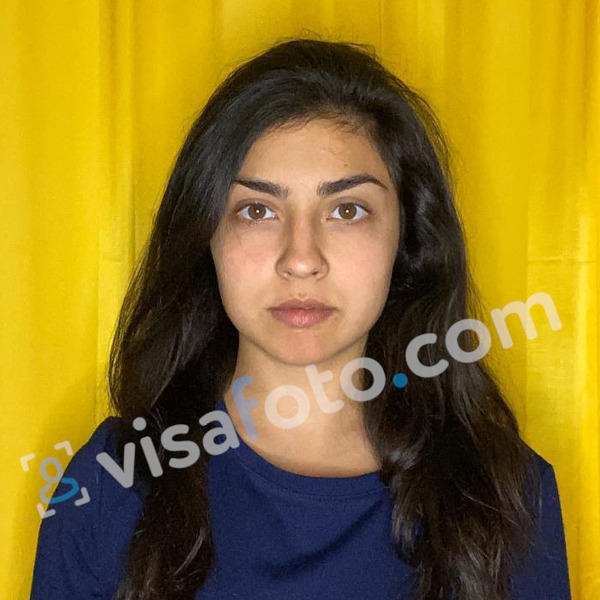
You will receive both a digital file for online submissions and a print-ready version. If you're unhappy with the result, we'll offer a free replacement. Should officials reject your photo, we provide a full refund.
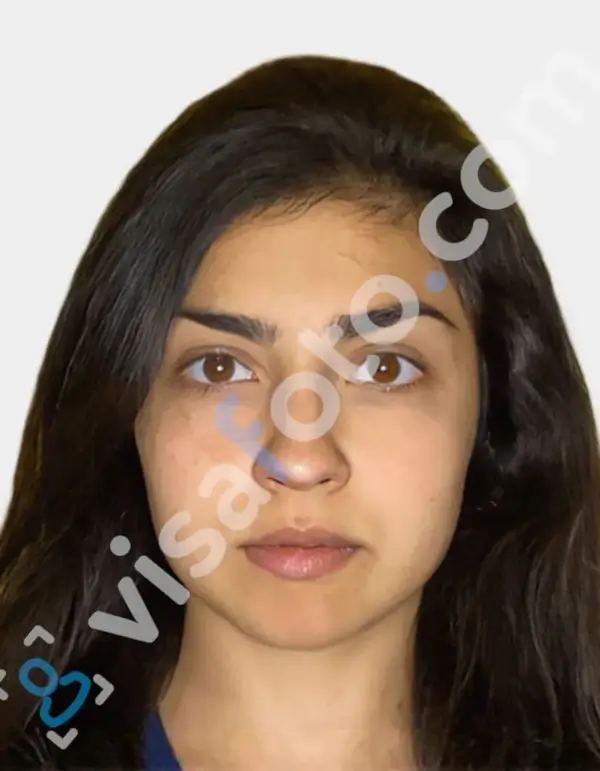
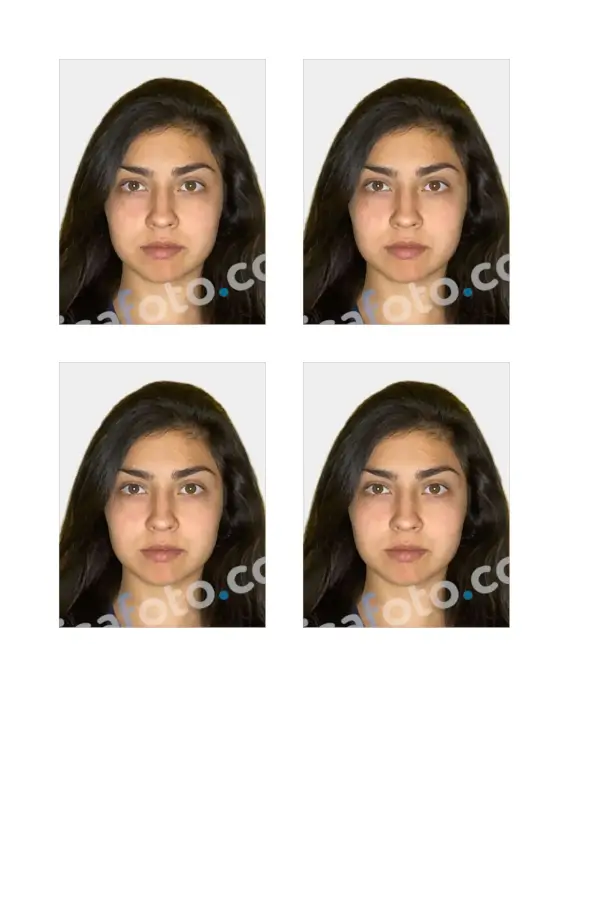
Thailand Visa Photo App
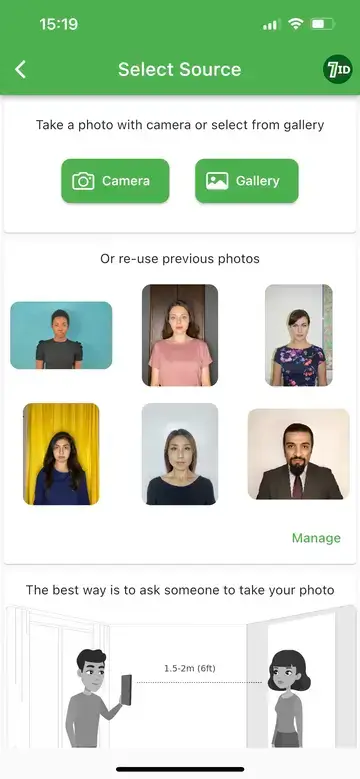
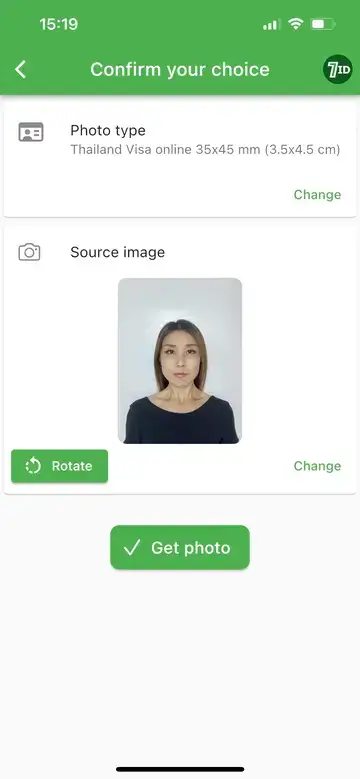
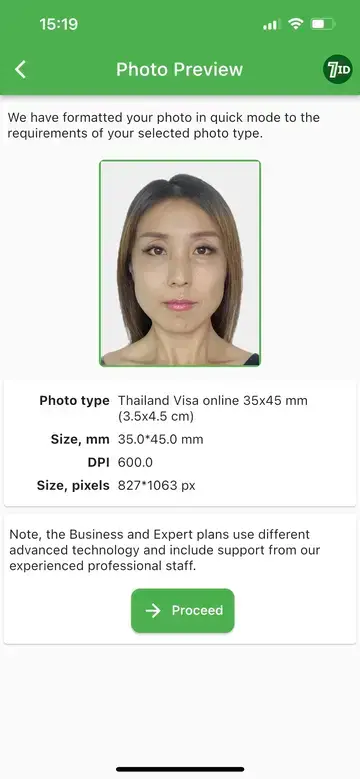
Explore the 7ID photo app, created by Visafoto. This handy app allows you to capture and edit your Thai Visa application photo directly from your iPhone or Android device.
7ID simplifies the process of taking and customizing document photos via your smartphone, suitable for both digital applications and physical printouts. Just upload your picture to the app, select the relevant country and document type, and the app will adjust your photo to match official specifications. This includes setting the correct size, format, background color, and proper alignment of the face and eyes.
You’ll get a digital copy and a printable template sized for standard paper formats like 4×6, A4, A5, or B5. Our technical support team is ready to assist with any questions or concerns you might have.
Thailand Visa processing time
The e-Visa processing time is generally up to 14 working days from when the visa fee is successfully paid. For traditional visa applications submitted in person at Thai embassies or consulates, processing usually takes between 3 and 10 working days.
Thailand Visa fees
Here’s a current Thai visa price list:
- Thailand Tourist Visa cost:
- Single entry: 2,000 Baht (about USD 60)
- Multiple entry: 10,000 Baht (about USD 295)
- Visa on Arrival (VoA): 2,000 Baht (about USD 60)
- Destination Thailand Visa (DTV): 10,000 Baht (about USD 295)
- Long-Term Resident (LTR) Visa: Around 50,000 Baht (about USD 1,475)
- Non-Immigrant Visa:
- Single entry: Approximately 8,000 Baht (about USD 236)
- Multiple entry: From 20,000 Baht (about USD 590) for one year to 40,000 Baht (about USD 1,180) for three years.
Thailand Visa extension rules
While the Thai e-visa duration typically covers short-term visits, travelers can apply for extensions at local immigration offices, often adding up to 30 days to their stay. The extension application must be submitted to the local immigration office before the original Thai Tourist Visa duration expires.
Visitors from 31 countries who are eligible for a Visa on Arrival are permitted a stay of up to 15 days. Note that this type of visa cannot be extended.
Holders of Non-Immigrant visas, such as those for business or education, may apply for extensions at local immigration offices, generally for an additional 30 to 90 days, contingent on the specific circumstances and visa type.
Streamline your Thailand Visa application process with the 7ID App and Visafoto!
Last updated: 2026-01-12
